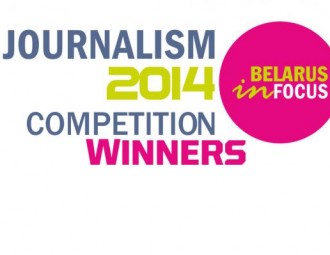Journalists writing about Belarus awarded in Warsaw

The award ceremony of “Belarus in Focus 2014”, the fourth edition of annual competition for journalists writing about Belarus for media outside Belarus, took place in Warsaw.
On Wednesday, April 15th, 2015 winners in the Fourth Edition of Belarus in Focus 2014 Journalism Competition received awards in the Polish capital. The winning journalists not only pitched an interesting story about distant Belarus to their editors, but also managed to explore the chosen topic and interestingly present it to their audiences.
The competition jury members awarded three professional journalists Simon Book (Germany), Paul Flückiger (Switzerland), and Malgozhata Lozovskaya (Russia) with a monetary prize of EUR 500 and three beginner journalists: João de Almeida Dias (Portugal), Paula Borowska (Poland), and Eva Coronado Alonso (Spain) with a monetary prize of EUR 300. In addition, Evgeny Karpov, Belarusian journalist received two prizes – ‘a special mention’ by the jury members and the special prize from the Guardian’s New East Network, the information and analitical network about former USSR and one of the partners in the competition. The Guardian’s London office will host Evgeny for a weeklong internship.
„Evgeny Karpov is clearly a bright young journalist with his finger on the pulse of Belarus. His analytical take on the Ice Hockey Championships in Minsk demonstrates a strong understanding of the political situation in his country and an ability to translate that for a western audience. We look forward to hosting him at the Guardian and have already begun talking about ideas for stories that he will work on while he’s with us. I’m confident that we will learn a lot from him, and hope that he will learn from us as well”, Judith Soal, the Guardian’s New East Network editor said while handing the award to Evgeny.
“This year, the most popular story was about Belarusian language courses. International media readers could get the impression that Belarusians en masse revive their native language and that it has become the trend of the year. Anyway, Belarus of 2014 will be remembered not only for political prisoners and repressions by Alexander Lukashenka and the authorities, but also for optimistic stories about the struggle for national revival and democracy”, Pavel Sheremet, founder of Belarus Partisan and one of the jury members said during the award ceremony.
In the viewpoint of Yuliya Slutskaya, Belarus in Focus Information Office director, the competition has evolved and developed, “during the four years of its existence, we have gained a lot of experience in promoting the competition and helping to put Belarus in the focus of attention by international media. We have many reliable partners who help us in advertising the competition. In addition, we have been working with some jury members for several consecutive years, which helped us to refine our selection criteria”.
The award ceremony concluded the three-day workshop for international and Belarusian journalists and competition jury members organised by Belarus in Focus Information Office and Press Club Belarus. During the workshop, participants discussed ideas for articles about Belarus, learned about international standards in journalism, digital security and tried to pitch their stories to the Guardian and other jury members.
The ceremony was moderated by Maria Przełomiec, Polish Journalists of Telewizja Polska and specialist on Eastern Europe. Journalists, media experts, and representatives of NGOs and diplomatic corps attended the ceremony to congratulate the winners.
Belarus in Focus 2014, the fourth edition of annual competition for journalists writing about Belarus for media outside Belarus, has received 51 articles by 40 authors from 14 countries, which were written in 2014. It was organised by Belarus in Focus Information Office and Press Club Belarus with the support of MYMEDIA/NIRAS. For additional information please visit the competition website.
-
03.01
-
07.10
-
22.09
-
17.08
-
12.08
-
30.09



























